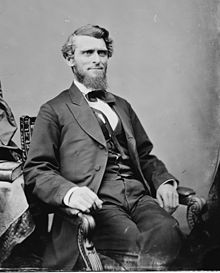Arthur I. Boreman
Arthur Ingraham Boreman (born July 24, 1823 in Waynesburg , Greene County , Pennsylvania , † April 19, 1896 in Parkersburg , West Virginia ) was an American politician and from 1863 to 1869 the first governor of West Virginia. He was also the US Senator for that state .
Early years and political advancement
Arthur Boreman had moved with his family to Tyler County in what is now West Virginia in 1827 at the age of four . After attending local schools and studying law privately with his brother, Boreman settled in Parkersburg, then Virginia , in 1843 as a lawyer. Boreman's political rise began in 1855 when he was elected to the Virginia House of Representatives . He was a member of the Whig Party then ; later he moved to the Republicans . Boreman remained in the state parliament until 1861. In those years before the Civil War , the division of the American nation into two opposing camps was particularly sharply reflected in Virginia. The state was divided, the majority of the eastern parts of the country sided with the south , while the majority in the north-western highlands sympathized with the north . Boreman, like the majority of his homeland, sided with the Union. Therefore, in 1861, he voted against secession at the Congress that decided Virginia's exit from the Union.
West Virginia's independence
At the congress where Virginia seceded from the Union, only 15 of 47 delegates from what is now West Virginia voted for this move; more than two thirds were against the connection to the south. A referendum a little later showed a similar picture. The majority of the entire then state of Virginia voted for secession, while the Northwest again voted against. Thereupon a congress was called under Boremans presidency after Wheeling . There the separation from Virginia was decided. They wanted to found their own state called Kanawha , which would then be accepted into the Union. The name, which went back to the Kanawha River , could not catch on; instead the name West Virginia was adopted. In the months that followed, work began on drawing up its own constitution. President Abraham Lincoln and Congress approved the admission of the new state, which took effect in June 1863. In the meantime, parts of the area were occupied by supporters of the Confederation, so that the new administration was initially unable to dispose of the entire new state. After the war there was a dispute with Virginia over the constitutionality of the founding of West Virginia. The US Supreme Court finally ruled in favor of West Virginia in 1870. There were also disputes with Virginia over the question of financial compensation. This matter was not settled until 1915 by a verdict of the US Supreme Court. West Virginia had to pay Virginia over $ 12 million. The last installment was not paid until 1939.
West Virginia Governor
From 1861 to 1863, Boreman served as a judge in the new state, which at that time was not yet officially a state of the USA. After official admission to the Union, Arthur Boreman was elected first governor. He took up his new office in June 1863. As governor he still had to deal with the events of the war in the first few years. There has been some military movement from both sides into the West Virginia area. Boreman built the National Guard , which was entrusted with restoring order. Then a new administration had to be set up first. After the war, the governor advocated free schools. He tried to lure foreign investors into his state and exploit its natural resources. But he was very resentful towards the former supporters of the Confederation. They were legally deprived of their right to vote for some time. After being re-elected twice, Boreman resigned shortly before the end of his term in February 1869 to take a seat in the US Senate.
Another résumé
Boreman served as a senator in Washington between 1869 and 1875 . There he was represented in several committees. After the end of the legislature, he returned to Parkersburg as a lawyer. He served as a judge in the West Virginia Fifth Judicial District from 1888 until his death in 1896.
Web links
- Arthur I. Boreman in the database of the National Governors Association (English)
- Arthur I. Boreman in the Biographical Directory of the United States Congress (English)
- The governors of West Virginia (English)
- Arthur I. Boreman in the database of Find a Grave (English)
| personal data | |
|---|---|
| SURNAME | Boreman, Arthur I. |
| ALTERNATIVE NAMES | Boreman, Arthur Ingraham (full name) |
| BRIEF DESCRIPTION | American politician |
| DATE OF BIRTH | July 24, 1823 |
| PLACE OF BIRTH | Waynesburg , Pennsylvania |
| DATE OF DEATH | April 19, 1896 |
| Place of death | Parkersburg , West Virginia |


